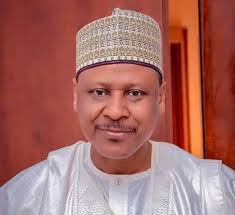The Nigerian Federal Government, under President Bola Tinubu’s leadership, has vehemently declared an all-out war against corruption, asserting that there will be no sanctuary for corrupt practices within the nation’s borders. Minister of Information and National Orientation, Mohammed Idris, delivered this unwavering message while simultaneously dismissing allegations that the administration is manipulating anti-corruption agencies to target political adversaries. These accusations arose following claims by former Vice President Atiku Abubakar, who contended that President Tinubu was weaponizing the Economic and Financial Crimes Commission (EFCC) to weaken the opposition in anticipation of the 2027 general elections. Abubakar’s statement warned that such actions posed a significant threat to Nigeria’s democratic principles.
The Minister of Information addressed these concerns head-on during the opening of the Independent Corrupt Practices and Other Related Offences Commission (ICPC) Roundtable Engagement on Agenda Setting for Strategic Integration of State Commissioners of Information in the Fight Against Corruption held in Abuja. He reinforced the government’s commitment to upholding the independence and operational autonomy of anti-graft agencies, emphasizing that they function without political interference. This commitment, he argued, underscores the Tinubu administration’s dedication to fostering a level playing field in the political landscape, where anti-corruption efforts are not perceived as tools for partisan vendettas but as essential mechanisms for upholding integrity and accountability.
Idris reiterated that combating corruption stands as one of the eight pivotal priorities of the Tinubu administration. This dedication is reflected in the government’s efforts to fortify the institutional framework that supports the fight against corruption, primarily through empowering the ICPC and EFCC. By abstaining from interference, the administration aims to demonstrate unequivocally that these agencies are not being employed for political witch-hunts but rather operating with professional integrity and adherence to the rule of law. This commitment seeks to rebuild public trust in these institutions and assure the populace that their actions are guided by principles of fairness and due process.
Underlining President Tinubu’s resolute stance against corruption, the minister asserted that no individual or entity, regardless of their position or influence, would find refuge or protection from the consequences of corrupt practices. He detailed ongoing comprehensive judicial reforms aimed at streamlining corruption trials and eradicating unnecessary delays, thereby ensuring swift and equitable justice. The government aims to address the longstanding issue of protracted legal proceedings in corruption cases, which often allows perpetrators to evade accountability and undermines the public’s faith in the justice system. These reforms are designed to ensure that justice is not only served but is seen to be served efficiently and transparently.
The Minister emphasized the significance of the roundtable’s theme, “Partnership for Strengthening Transparency and Accountability at State and Local Government Levels Through Strategic Communications,” highlighting the crucial role of state information commissioners in disseminating government messages throughout all levels of society. He posited that transparency and accountability are fundamental pillars of a thriving democracy, representing the core principles underpinning President Tinubu’s administration. Effective communication is seen as essential to these principles, ensuring that citizens are informed about government policies and actions, and that they have the necessary information to hold their leaders accountable.
Idris further called on state governments and officials to transcend partisan divides and actively contribute to the realization of the national development agenda. He urged all state commissioners, irrespective of their political affiliations, to embrace the opportunities inherent in President Tinubu’s “Renewed Hope Agenda.” This agenda, he explained, is focused on revitalizing the Nigerian economy, addressing historical neglect, and promoting inclusive growth, diversification, and steady development. The minister’s appeal underscores the importance of collaborative governance, where all stakeholders work together in the national interest, transcending political differences for the betterment of the nation as a whole. He also commended the ICPC, under the leadership of Dr. Musa Aliyu (SAN), for its innovative communication strategy that engages stakeholders at the state and local levels, facilitating the effective dissemination of government policies to the grassroots. This approach recognizes the importance of reaching all segments of society, ensuring that everyone is aware of government initiatives and can participate in the national development process. By fostering inclusivity and transparency in communication, the government aims to build a stronger and more unified nation.














